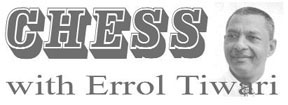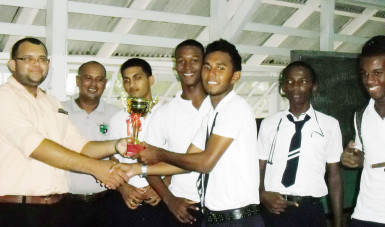“Of those to whom much is given, much is asked.” – The first line of a speech delivered by US President Lyndon B Johnson in Washington, DC, on March 31, 1968.
In countries the world over, especially the serious and fruitful chess-playing nations, being president of the national chess organization, reflects keenness of perception, influence and overwhelming prestige. Very likely, the holder of the office of the presidency is a chess player or a former chess player. For Guyana, which is not in the upper echelons of global chess, the prominence of that exemplary chess office, is universally recognized. Two Heads of State—Forbes Burnham and David Granger—held the presidency of the local chess organization.
Irshad Mohammed was elected president of the Guyana Chess Federation on February 9, 2014. He took over from Shiv Nandalall who did not seek re-election owing to his critical business commitments. Mohammed became popular in local chess because he oversaw a Saturday afternoon chess class for children at the Oasis Café. Oasis’ owner William Walker provided the venue for the classes to be held and even sponsored a chess tournament that quoted a sizeable purse and other impressive prizes. A few years later, Mohamed was successful in capturing chess’s prized possession, the coveted presidency.
 The office is more sentimental and purposeful than lucrative. There is an absence of deep-pocket benefactors for chess in Guyana, which in fact resonates throughout the world. Chess is not a spectator game and does not have prime-time coverage like some other games, although according to a census study conducted by YouGov, some 700 million people actually actively play chess.
The office is more sentimental and purposeful than lucrative. There is an absence of deep-pocket benefactors for chess in Guyana, which in fact resonates throughout the world. Chess is not a spectator game and does not have prime-time coverage like some other games, although according to a census study conducted by YouGov, some 700 million people actually actively play chess.
Much was promised as Mohammed fitted himself comfortably in the chair which Nandalall had vacated. In September 2014, Mohammed was responsible for organizing a chess team to participate in the Tromso Olympiad after an absence of 34 years. The last time Guyana attended a chess Olympiad was 1980 in Malta. The composition of the team for last year’s Olympiad raised several eyebrows because the selection method was questionable. But no one is manifestly perfect in making decisions for a sporting organization as is evidenced globally.
Next, Mohammed was instrumental in bringing the regional Umada Cup Open chess tournament to Guyana at the end of 2014. These are admirable awakenings on behalf of the game in Guyana, but what about the local tournaments? Since his accession to office, no national championships have been held; none in 2014, nor in 2015. The last national chess championship was held in 2013 under the auspices of Nandalall. What happened?

There is no time to luxuriate in juxtaposition to satisfying the local chess community. The last tournament to be held locally, was the Burnham Memorial at the end of August. In both years, there was also an absence of the exciting national schools’ chess championship. Naturally, the withholding of the national and schools’ championships have disappointed a patient and serene chess community. I feel certain there were insurmountable difficulties, which perhaps required, sometimes, a Solomonic solution. But if Mohammed is continually reticent, how can one suggest a workable solution, not necessarily a Solomonic one?
However, federation or no federation, Guyana’s chess is quietly moving on. School of the Nations University student Jessica Clementson has established the U-Knighted Chess Club and is preparing a Guyana women’s team to participate in the 2016 chess Olympiad. Clement Corlette played the strong Suriname Open which boasted a sprinkling of international and grandmaster entrants. And a Berbice school championship was held in the final quarter of 2015.
Nevertheless, Mohammed and the Guyana Chess Federation are crucial to the acceleration of chess locally. It is to be hoped that 2016 would be a progressive one for chess in Guyana.




